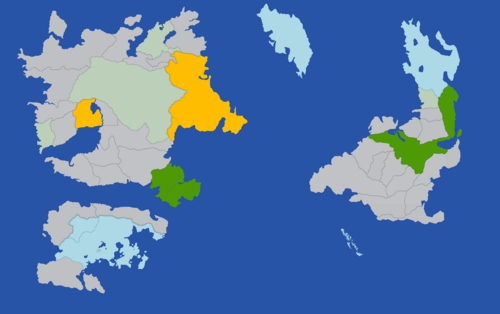Difference between revisions of "Spaceflight"
Lauderdalle (talk | contribs) |
(→Uncrewed programs: kardabad canonically doesn’t exist anymore) |
||
| Line 12: | Line 12: | ||
! Spacecraft | ! Spacecraft | ||
! Launcher(s) | ! Launcher(s) | ||
| − | |||
| − | |||
| − | |||
| − | |||
| − | |||
| − | |||
| − | |||
| − | |||
|- | |- | ||
| [[Department of Space Exploration (Reykanes)|Department of Space Exploration]]<br />''Geimkönnunardeild'' | | [[Department of Space Exploration (Reykanes)|Department of Space Exploration]]<br />''Geimkönnunardeild'' | ||
Revision as of 15:45, 8 December 2022
Spaceflight (or space flight) is an application of astronautics to fly spacecraft into or through outer space, either with or without humans on board. Most spaceflight is uncrewed and conducted mainly with spacecraft such as satellites in orbit, but also includes space probes for beyond orbit of Terraconserva. Such spaceflight operates either by telerobotic or autonomous control.
Contents
History
Uncrewed programs
| Space agency | Sponsor nation/organizations | Program(s) | First launch(es) | Program start date(s) | Spacecraft | Launcher(s) |
|---|---|---|---|---|---|---|
| Department of Space Exploration Geimkönnunardeild |
Unknown | Unknown | Planned for 2022 | Unknown | Unknown |
Crewed flight
Humans have flown to the Moon a cumulative of nine times, through programs sponsored by the Qubecshirite and Eminopler governments, and a continous human presence in orbit has been maintained through the Terraconserva Orbital Station. Five countries have the capabilities required to independently manage human spaceflight operations- Two nations participate by providing astronauts to serve as crew. While commercial crewed spaceflight exists, a large majority of the aerospace industry produces launch hardware for satellites.
Milestones
First person in space
First person in orbit
First spacewalk
First manned rendezvous
First manned docking
First departure from LTO
First manned orbiting of the Moon
First person(s) on the Moon
Programs
Current programs
| Nation/Organization | Space agency | Program(s) | Term(s) for space traveler | First launched astronaut(s) | Program start date(s) | Spacecraft | Launcher(s) |
|---|---|---|---|---|---|---|---|
| Quebecshirite Space Agency Agencie Spatiale Quebecshirite |
Unknown | Unknown | Unknown | Unknown | Unknown | Unknown | |
| Aether Industries | Aether Industries (previously publicly owned joint venture) |
Dream Chaser | Astronaut(s) | Unknown | 2012 | Grecopolis Hephaestus |
Unknown |
Planned future programs
| Nation/Organization | Space agency | Term(s) for space traveler | Date | Spacecraft | Launcher | Type |
|---|---|---|---|---|---|---|
| Paleocacherian Extraterrestrial Exploration Directorate Stiúrthóireacht Taiscéalaíochta Spáis Seachtrach |
Unknown | Planned for 2021 | Unknown | Unknown | Orbital | |
| Federal Baltanlan Space Agency | Unknown | Planned for 2022 | Unknown | Unknown | Orbital |
Safety
2021 Ansa 4 Disaster
Baltanla's Ansa 4 rocket broke up inflight, leading to numerous causalities when a fuel tank collided with a skyscraper.
2022 Hephaestus Disaster
On 15 October 2022, Aether Industries's Mission Hephaestus to repair satellite Project Poseidon suffered a loss of control and crashed into the Kivu Ocean.[1] While the investigation is ongoing, it is speculated that there was a technical fault within the craft's operating system, Doors OS.[citation needed]
References
- ↑ Aether Industries (15 October 2022). "Aether Industries Mission Log: Mission Hephaestus". Retrieved 16 October 2022.
